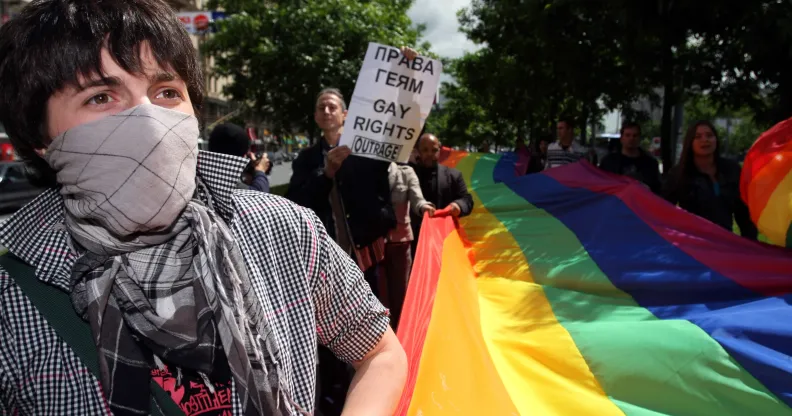Russian schoolchildren are overwhelmingly tolerant of LGBT people, study finds

Members of the Russian gay community and gay rights activists from Europe hold flags during a banned gay rally in Moscow on May 29, 2008. (ANDREY SMIRNOV/AFP/Getty)
Schoolchildren in Russia are highly tolerant of LGBT+ people, according to a sociological study on the views of youngsters in the country.
Following anti-government protests attended by thousands over the summer, Russian authorities have been targeting youth with recent initiatives including funding for patriotic education and a ban on minors attending protests.
But the new study found that 62 per cent of Russian youth say they are patriots and while 70 per cent had heard about the recent wave of protests, 75 per cent said they wouldn’t protest themselves.
And, perhaps most surprisingly, only 17 per cent of Russian youth say they have negative views about LGBT+ people.
Sixty-eight per cent have “normal views” on the LGBT+ community, and 13 per cent say they “trust” sexual minorities.
“This means that our conception about the patriarchal nature of the country is more likely coming from above than below,” psychologist Alexander Kolmanovsky said in comments about the study, according to the Moscow Times.
The study was by Russian PR firm Mikhailov & Partners, who polled 1,057 people aged 10 to 18 in 52 Russian regions during the month of September, 2019.
The news comes as Russian LGBT+ activists urge the government to investigate a “gay hunting” website, thought to be responsible for the recent murder of LGBT+ activist Yelena Grigoryeva.
Russia is well-known for having strict anti-LGBT+ laws. The county’s controversial ‘gay propaganda law’, a unanimously approved federal bill, has prohibited even the mention of homosexuality since 2013.
But, while homophobia and violence are part of day-to-day reality for Russia’s LGBT+ community, there is more to LGBT+ life in Russia than just oppression.
The queer Russian underground already exists: there are raves, drag parties, online publications and support networks and, most importantly, a new crop of outspoken role models for whom queerness is an integral part of their identity.
Following the protests, Russian authorities have also announced plans to fund military education and monitor the online behaviour of the younger Russian generation.

